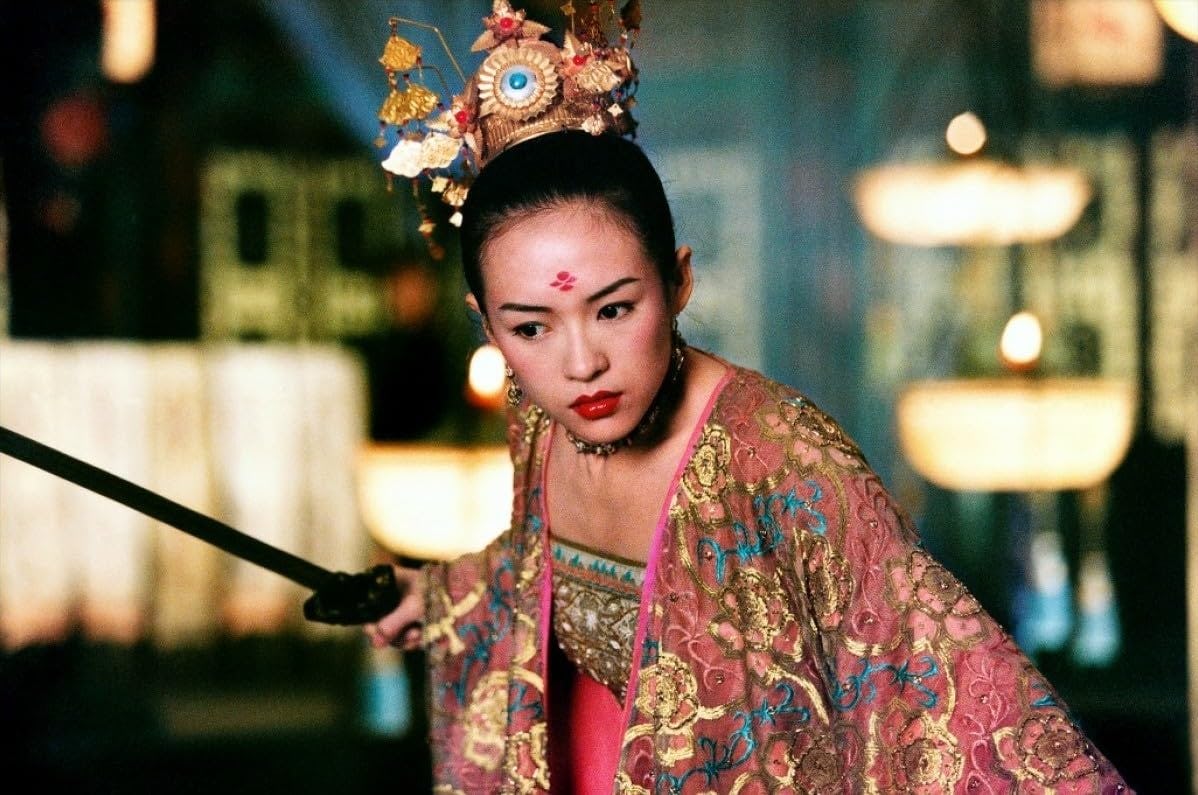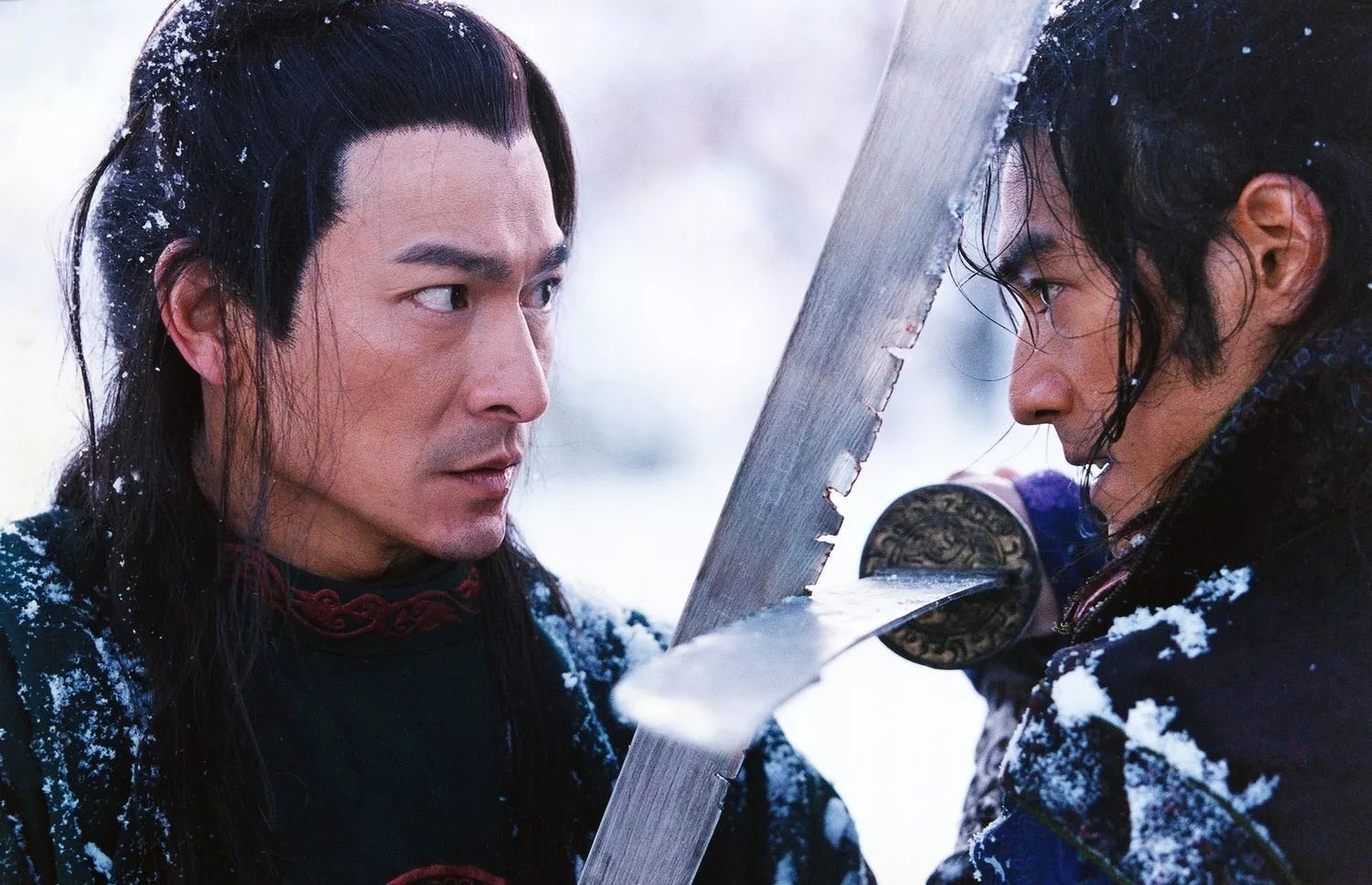
Martial arts epics have long been a stateside staple, but the early 2000s piqued the interest of the masses like no other. Blockbusters like Crouching Tiger, Hidden Dragon and Hero dominated the zeitgeist in a major way. The two films are some of the biggest wuxia epics in history, and for good reason — but their reputation was so renowned that they eventually eclipsed any other worthwhile contenders for the same recognition.
House of Flying Daggers was one such contender, directed by Hero’s Zhang Yimou and featuring some of the brightest stars of the wuxia wave. It has all the doomed romance (give or take a few icky power dynamics) of Crouching Tiger, paired with Zhang’s trademark affinity for color. Where Hero is awash in inky blacks, pulpy reds, and blue horizons, Flying Daggers explodes with warm pinks and endless walls of green. It’s also a film focused more on pathos — particularly where its doomed love triangle is concerned — than action, a choice that may or may not have kept this story sidelined.
For the past 20 years, Flying Daggers has been trapped in the shadow of its predecessors. Though it premiered four years after Crouching Tiger and two after Hero, some critics felt like it was riding the wave of their success without bringing anything new to the table. It’s as silly an assumption now as it was then, as the differences between the 2004 film and its contemporaries should be clear enough. Flying Daggers does share plenty of connective tissue with other films of its ilk, from its sweeping wire-fu to its byzantine plot, and even to its leading lady, Zhang Ziyi. But that doesn’t mean it shouldn’t be celebrated on its own merits, especially as the film holds up just as well today.
Flying Daggers may be one of the most visually bewitching films of the 21st century, but it's also supplemented by a story that’s just crazy enough to work. Set in the waning days of China’s Tang dynasty, Flying Daggers explores the rising tensions between a secret society, the House of Flying Daggers, and the enforcers working overtime to thwart them. After taking down the Daggers’ last leader, two government deputies — the strong, silent Leo (Andy Lau) and his brash junior Jin (Takeshi Kaneshiro) — hatch a plan to capture his successor. Their mission brings them face-to-face with Mei (Zhang Ziyi), a seemingly blind dancer who quickly proves to be much more than she seems.
Jin assumes the role of a Daggers sympathizer, rescuing Mei from police custody and promising to bring her back home in one piece. Their escape won’t be easy with Leo and a small army of enforcers on their tail, and the closer Jin gets to Mei, the harder it is to keep up his act. As Flying Daggers is peak melodrama, though, Jin’s not the only one hiding behind half-truths. Both Mei and Leo have their secrets of their own, which land like bombshells in the film’s twisty second act. Each revelation tries hard to outdo the last, and the narrative does push the limits of credibility here and there.
Zhang is a master of both sprawling aesthetics and intimate narratives, and for all its flaws, Flying Daggers may be the best example of that balance. Our trio’s journey is occasionally unwieldy, especially when it’s meant to take a backseat to a major action setpiece. But it always comes back to Mei, Jin, and Leo — and once Zhang begins to peel back the layers of their mutual attraction and conflicting duties, the film rarely wavers.

Flying Daggers is undeniably a sensual film, but a lot of that lives in the cinematography, believe it or not. Its central love story, by contrast, can be hard to sit through — the question of control, and autonomy, haunts Mei at every turn. Our heroine is introduced as a character with razor-sharp self-awareness, and there’s rarely a doubt that she’s in control of the narrative. But as animosity grows between the film’s competing male egos, Mei finds herself caught in the middle.
Whether she can escape Jin and Leo’s quest to win her — or, honestly, to own her — is what makes Flying Daggers so tragic. Despite her guile, Mei is fighting tooth and nail for any semblance of autonomy. What little she has is relentlessly abused by the men who claim to love her, and her plight demonstrates the destructive power of male fragility.
By today’s standards, it may be easy to write the film off as a pure objectification piece, one that caters exclusively to the male gaze and leaves its female lead out to dry. Upon closer inspection, though, Flying Daggers is the kind of feminist tragedy that isn’t afraid to balance tough themes with such tangible romanticism. That it still feels eerily timely, even two decades later, is definitely bittersweet, but maybe its added relevance will allow the film to stand on its own before long.







